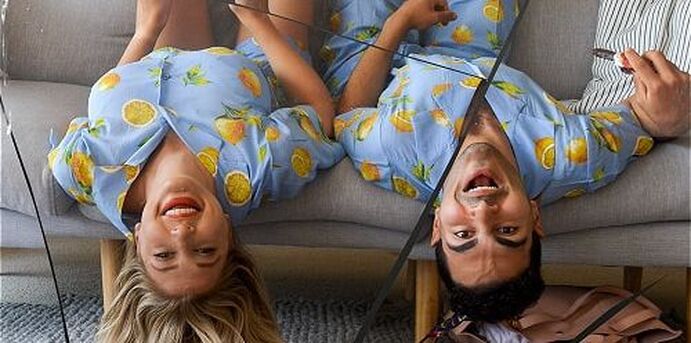Jenny Nimon
The audience filters in to a reel of video clips being projected onto the back wall, and they are familiar moments – Jacinda Ardern’s response to a reporter asking if she met with Prime Minister of Finland Sanna Marin because of their closeness in age is one that sticks out to The Culture’s first Wellington audience. The pattern of misogyny in the footage is quickly apparent and sets the stage for the sexism and homophobia that Katie (Jackson) and Will (Mina Asfour) are about to endure. The set design is simple and evokes an apartment, which is all it really needs to do: there’s a couch, a side table, some stools and two clothes racks – one for each character, respectively (Katie is definitely fond of the colour pink).
Jackson and Asfour have brilliant chemistry, so brilliant in fact that I am shocked to discover that Asfour is the second person to play Will (the role was previously performed by Mansoor Noor). These two are so comfortable with each other that I could believe they were flatmates or best friends in real life; there’s huge energy and charisma there, and the show is so fast-paced that at times it feels difficult to keep up, though not in a bad way – they are out living their lives and are not about to stop and accommodate us.
We watch them recording podcasts and livestreams, playing around on dating apps and attending work functions dressed as Voldemort and a vulva. It’s light, it’s funny; it might be the only way to stay sane when faced with chronic misogyny and homophobia. Everything is there in terms of delivery, but I would like to see more depth of character. These characters very much lean into the stereotype of ‘bossbabe white girl and her gay best friend’, and it would be good to get a bit more nuance from the relationship. The pair come off as disingenuous and emotionally immature, and it’s hard to tell if this is something the show is aware of and is satirising or if it’s something that slipped into the writing by accident. That said, the slow unravelling of their relationship works incredibly well. The show is structured around their routine as friends and flatmates, so we get to see the ways in which their ‘givens’ begin to falter and their needs stop being met.
At about the two-thirds mark, the show takes a drastic turn. We move from a story about friendship and existing traumas at the hands of the patriarchy (workplace sexism, homophobia, eating disorders, etc. etc.) to a full-blown domestic violence narrative, and it comes from left field. For me, this feels like a classic case of a team trying to force two shows’ worth of material into one, and the result is, again, not enough nuance. These are huge subjects, and they deserve to be given space and explored in full – not crammed into a melodramatic final 15–20 minutes of a show. The Culture has a huge amount of presence and potential, but it does itself a disservice by trying to be everything. There’s only so much that you can hope to achieve in an hour.
Powersuit Productions is definitely a team worth looking out for, even if just for their energy alone, but I hope that future productions will explore themes like these with more depth, care and complexity.
The Culture is showing at the Gryphon Theatre at 8:30pm until Saturday 4 March before continuing to tour across Australia. To book tickets, visit the Fringe website.






